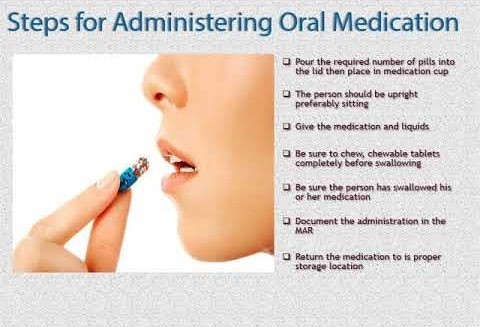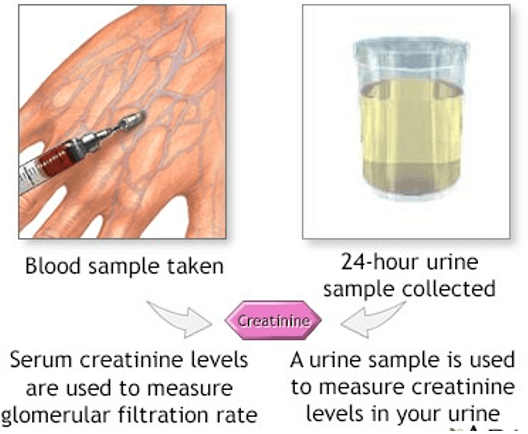A nurse is administering a client's morning oral medications. Which of the following actions should the nurse take?
Verify the medication three times with the medication administration record.
Document medication administration prior to administering medication.
Administer time-critical medication 60 min before or after the scheduled time.
Identify the client by using one identifier before giving the medication.
The Correct Answer is A
When administering oral medications, the nurse should verify the medication three times with the medication administration record to ensure that the correct medication is being given to the correct client at the correct time. This is known as the "three checks" and is an important step in preventing medication errors.

Nursing Test Bank
Naxlex Comprehensive Predictor Exams
Related Questions
Correct Answer is C
Explanation
C, "You can begin collection of urine after discarding your first morning void."
A 24-hour creatinine clearance test is used to evaluate how well the kidneys are functioning by measuring the amount of creatinine in the blood and urine over a 24-hour period. During the test, the client is asked to discard their first morning void and then collect all urine for the next 24 hours.
Option A is incorrect because a protein-rich diet can affect the creatinine levels in the urine, which can result in inaccurate test results. Therefore, the nurse should advise the client to avoid a protein-rich diet during the collection period.
Option B is incorrect because blood glucose levels are not relevant to a 24-hour creatinine clearance test. Therefore, the nurse should not ask the client to record their blood glucose level each time they void.
Option D is incorrect because using an antiseptic towel to cleanse the perineal area can also affect the test results by introducing contaminants into the urine sample. Therefore, the nurse should advise the client to cleanse the perineal area with soap and water or an alcohol wipe.

Correct Answer is ["B","C"]
Explanation
Turn cellular phones to silent mode: In an active shooter situation, it is crucial to maintain silence to avoid drawing attention to your location. Switching cellular phones to silent mode helps ensure that ringtones or notifications do not alert the shooter to your presence.
Wave hands to attract the attention of law enforcement: When law enforcement or emergency personnel arrive at the scene, it is essential to signal to them that you are not a threat and that you require assistance. This can be done by putting hands up, keeping them visible, and following any instructions provided by law enforcement.
Move wounded clients to a safe area before finding shelter: It is important to prioritize the safety of individuals involved in an active shooter situation. However, moving wounded clients should be done only if it can be done quickly and without putting oneself or others at risk. The primary goal is to seek safety and follow established protocols, such as "run, hide, fight" principles, rather than focusing on moving injured individuals during an ongoing threat.
Attempt to bargain with the shooter: Bargaining or negotiating with an active shooter is strongly discouraged. It is important to remember that the primary goal in an active shooter situation is to ensure personal safety and the safety of others. Engaging with the shooter may escalate the situation or put oneself and others at greater risk.
The in-service should focus on providing staff members with practical guidance on how to respond to an active shooter situation, emphasizing the importance of following established protocols, staying calm, and seeking safety. Additionally, the in-service should include training on recognizing and reporting suspicious behavior, as prevention and early intervention can play a crucial role in mitigating such incidents.
Whether you are a student looking to ace your exams or a practicing nurse seeking to enhance your expertise , our nursing education contents will empower you with the confidence and competence to make a difference in the lives of patients and become a respected leader in the healthcare field.
Visit Naxlex, invest in your future and unlock endless possibilities with our unparalleled nursing education contents today
Report Wrong Answer on the Current Question
Do you disagree with the answer? If yes, what is your expected answer? Explain.
Kindly be descriptive with the issue you are facing.
